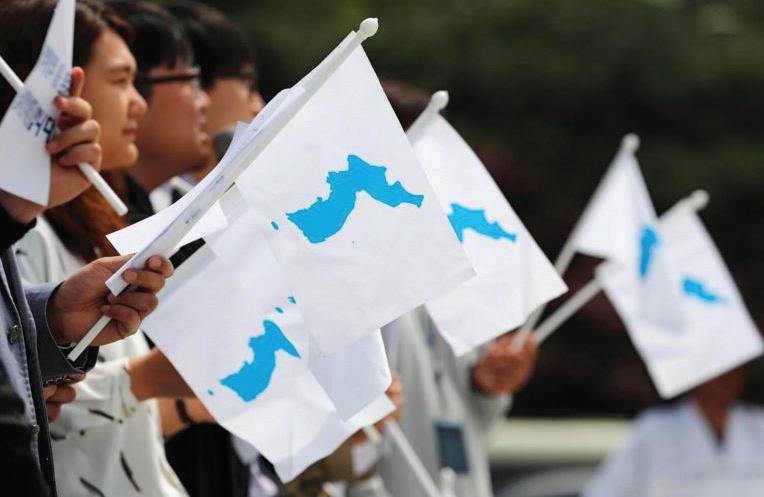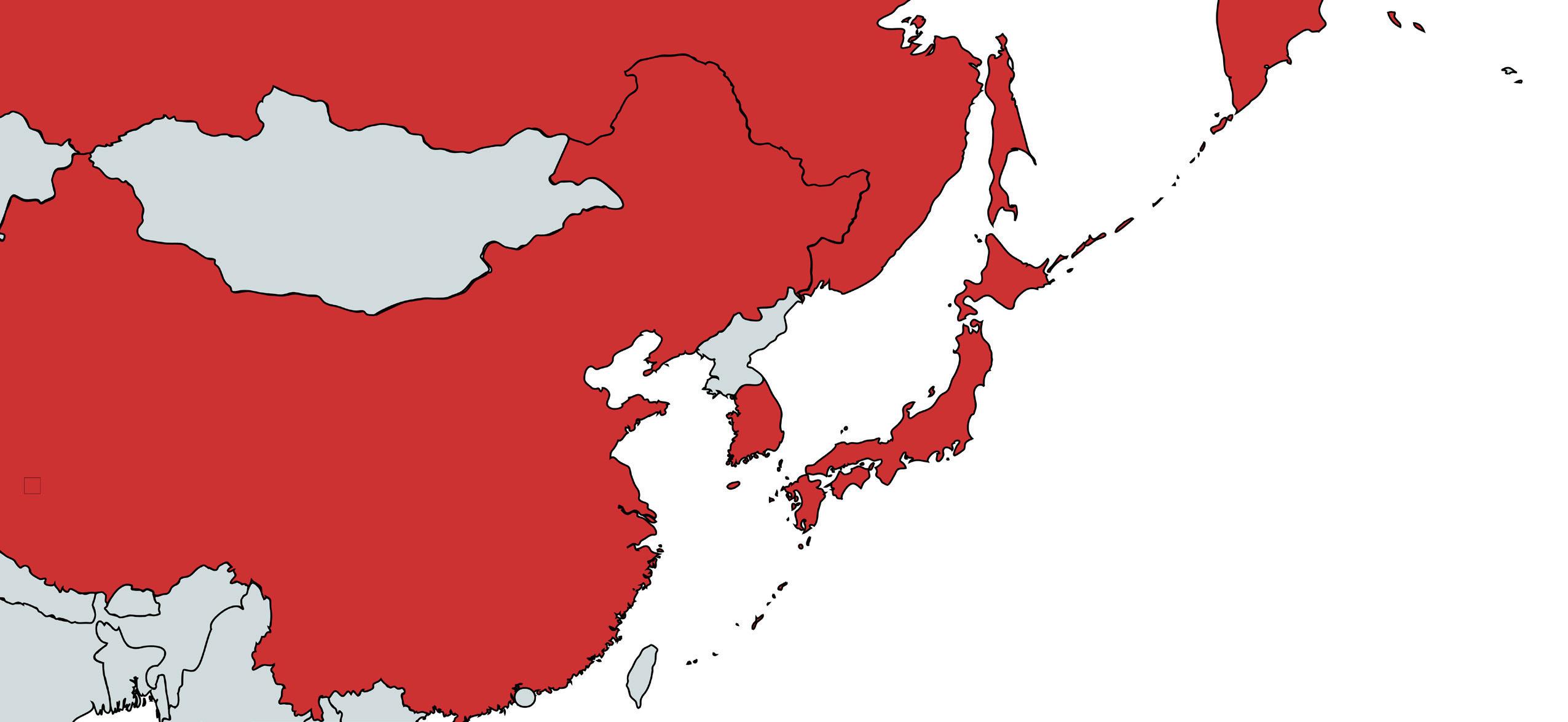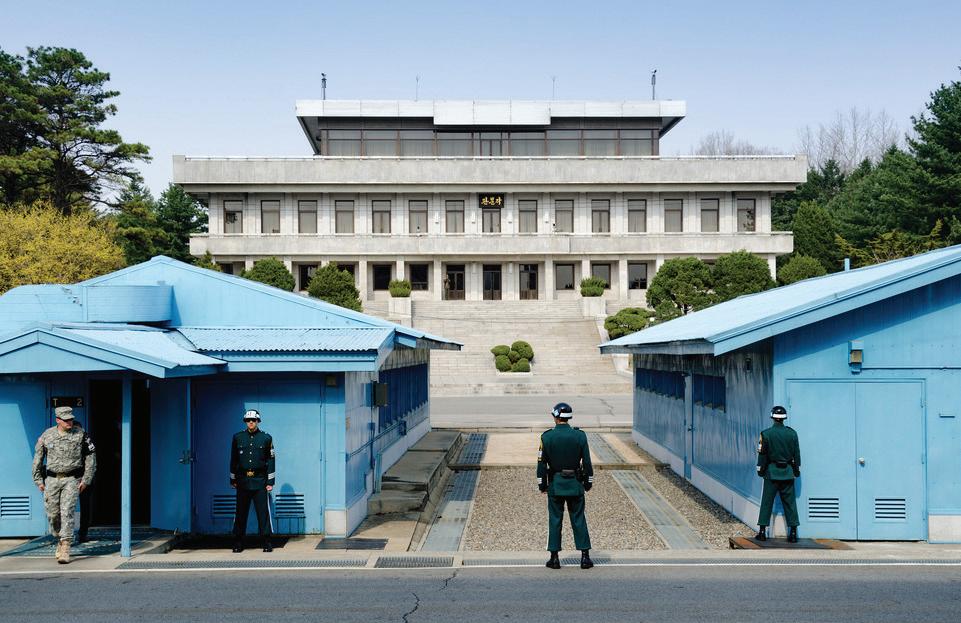
6 minute read
The current situation: main impediments to progress
If the United States, North Korea, and a majority of regional actors support nuclear negotiations, then why does the process appear to have stalled? The answer is that the United States and North Korea are at odds regarding the sequencing of negotiations and the extent to which steps taken by one side deserve a corresponding concession from the other.
Sequencing
The overarching disagreement between the United States and North Korea is over the sequencing of the denuclearization process. The U.S. position is that North Korea must first take concrete steps toward denuclearization, such as providing an inventory of its nuclear program, allowing inspections of production sites, and/or dismantling these facilities. Only then, the United States argues, will the international community be able to trust that North Korea is committed to denuclearization. Providing sanctions relief, economic aid, security assurances, and signing a peace declaration before North Korea has taken any such steps would reward North Korea for mainly symbolic actions.27
North Korea, on the other hand, insists that it will not proceed with denuclearization unless each North Korean action is met with a corresponding U.S. action. Minister of Foreign Affairs Ri YongHo alluded to this during his speech at the General Assembly of the United Nations when he said successful denuclearization will occur “under the principle of simultaneous actions, step by step... giving priority to trust-building.”28 This position is consistent with North Korea’s position in past negotiations: the country has always pushed for an action-for-action, reciprocal approach to negotiations, rather than acquiescing to demands that it make concessions up front and settle for delayed gratification.
Furthermore, North Korea argues that some steps that the United States is holding out as “rewards” for denuclearization, particularly a peace declaration and sanctions relief, are in fact necessary preconditions for successful negotiations.29 According to North Korea, given the United States’ longstanding “hostile policy,” the United States is responsible for making North Korea feel secure enough to denuclearize.30
27 U.S. government officials interviewed have defined “symbolic steps” as those that do not reduce the nuclear threat, but ostensibly demonstrate good will from North Korea. 28 UN General Assembly. (2018, September 29). Statement by H.E. RI Yong Ho, Minister for Foreign Affairs of the Democratic People’s Republic of Korea at the General Debate of the 73rd Session of the General Assembly of the United Nations. Retrieved from https://gadebate.un.org/sites/default/files/gastatements/73/kp_en.pdf 29 KCNA Watch. (2018, October 2). War End Is Not Just Gift: KCNA Commentary. KCNA. Retrieved from https://kcnawatch.co/newstream/1538428813-707473732/war-end-is-not-just-gift-kcna-commentary 30 UN Web TV. (2018 September 29). DPRK - Minister for Foreign Affairs Addresses General Debate, 73rd Session [video file]. Retrieved from http://webtv.un.org/search/democratic-people’s-republic-of-korea-minister-for-foreign-affairs-ad-
HEADER
Disagreements regarding specific steps in the process
At a more granular level, disagreements regarding the timing and sequencing of several key steps have stalled the negotiations. The most significant of these include declarations detailing North Korea’s nuclear program, sanctions relief, and a peace declaration.
Nuclear declarations
Throughout 2018, the United States called on North Korea to provide a comprehensive inventory of its nuclear program, including all sites related to fissile materials, nuclear warheads, and their delivery vehicles. The Trump administration maintained that a declaration would signal North Korea’s commitment to denuclearization and allow negotiators to hammer out agreements regarding inspections, dismantlement, and verification.
North Korea, however, is reluctant to provide a full nuclear declaration up front. Kim has reportedly said that he fears that providing a full declaration at this stage—that is, before the two sides have built the requisite amount of trust—would essentially provide the United States with a target list.31
According to some experts, North Korea also worries that even a list provided in good faith may not satisfy the international community. A list may be incomplete due to human error or perceived as incomplete by actors who do not trust North Korea.32 In either case, disputes over a nuclear declaration could very well derail negotiations.33 (Of course, skeptics contend that North Korea is reluctant to provide an inventory of its nuclear program not because of security or process concerns, but rather because Kim has no interest in denuclearizing.)
In November 2018, the Trump administration dropped its demand that North Korea provide a full declaration prior to the next summit meeting between Trump and Kim, but Vice President Mike Pence warned that “it will be absolutely imperative in this next summit that we come away with
dresses-general-debate-73rd-session/5842140884001 31 Wong, E., & Sanger, D. E. (2018, December 04). Trump to Meet With Kim Jong-un, Despite North Korea’s Lapses, Bolton Says. The New York Times. Retrieved from https://www.nytimes.com/2018/12/04/us/politics/trump-kim-north-korea-summit-meeting.html 32 Hecker, S. S. (2018, November 28). Why Insisting on a North Korean Nuclear Declaration Up Front is a Big Mistake. 38 North. Retrieved from https://www.38north.org/2018/11/shecker112818; Hecker, S. S. (2008). Denuclearizing North Korea. Bulletin of the Atomic Scientists, 64(2), 44–49. https://doi.org/10.2968/064002011 33 Arms Control Association. (n.d.). Chronology of U.S.-North Korean Nuclear and Missile Diplomacy. Retrieved from https://www.armscontrol.org/factsheets/dprkchron
a plan for identifying all of the weapons in question, identifying all the development sites…”34 In other words, the Trump administration appears to have kicked the can down the road rather than changed its position.
Sanctions relief
As mentioned above, the United States has refused to offer meaningful sanctions relief until North Korea makes significant progress on denuclearization. This position is consistent with the Trump administration’s belief that international sanctions were key in bringing North Korea to the negotiating table. Letting up pressure now, the argument goes, would surrender leverage that is necessary to lock North Korea into a denuclearization process.35
Unsurprisingly, North Korea rejects this assessment and has adamantly maintained that it will not respond to sanctions-related pressure. North Korea’s calls for sanctions relief have grown increasingly strident in recent months.36 In November 2018, several North Korean statements warned that North Korea may return to its byungjin policy of concurrent nuclear and economic development should the United States refuse to consider sanctions relief and/ or a reciprocal approach to negotiations.37
Peace declaration
Finally, a peace declaration formally ending the Korean war has become a sticking point. Although President Trump reportedly promised Kim that he was willing to sign a peace declaration, the Trump administration appeared to backtrack in the months following the summit.38 As with sanctions relief, the United States’ official position is that a peace declaration is a significant concession that should not be awarded until North Korea proves its commitment to denuclearization.39
34 Hillyard, V. (2018, November 15). Second Trump-Kim Summit to Go Ahead Without List of Nuclear North Korean Weapons, Pence Says. NBC News. Retrieved from https://www.nbcnews.com/politics/national-security/secondtrump-kim-summit-go-ahead-without-list-nuclear-north-n936481 35 Taylor, A. (2018, November 7). Trump’s North Korea Diplomacy Quietly Stalls. The Washington Post. Retrieved from https://www.washingtonpost.com/world/2018/11/07/trumps-north-korean-diplomacy-quietly-stalls/?noredirect=on&utm_term=.4ba3410fe797 36 KCNA Watch. (2018, October 20). Does U.S. Feel Ashamed of Itself for Approaching DPRK with Two Faces. KCNA. Retrieved from https://kcnawatch.co/newstream/1540041023-719196955/does-u-s-feel-ashamed-of-itselffor-approaching-dprk-with-two-faces 37 Denyer, S. (2018, November 03). North Korea Threatens to Restart Nuclear Program Unless U.S. Lifts Sanctions. The Washington Post. Retrieved from https://www.washingtonpost.com/world/asia_pacific/north-korea-threatens-to-restart-nuclear-program-unless-us-lifts-sanctions/2018/11/03/1e0b0f90-df63-11e8-aa33-53bad9a881e8_story. html?utm_term=.8adc5671b059 38 Ward, A. (2018, August 29). Exclusive: Trump Promised Kim Jong Un He’d Sign an Agreement to End the Korean War. Vox Media. Retrieved from https://www.vox.com/2018/8/29/17795452/trump-north-korea-war-summit-singapore-promise 39 Shesgreen, D. (2018, September 05). North Korea Wants Peace Declaration Ending Korean War, but Trump Officials Resisting. USA Today. Retrieved from https://www.usatoday.com/story/news/world/2018/09/05/why-korean-war-peace-declaration-stalling-nuclear-talks-north-korea/1149666002
North Korea has stated that the first two of the four points in the Singapore summit’s joint statement refer to establishing a new bilateral relationship and building a peace regime on the Korean peninsula—objectives, the North Koreans claim, that can only be achieved by first declaring an end to the war.40
Caption: South Korean students hold flags symbolizing unification at a peace rally in Seoul on April 26, 2018 Image Credit: Reuters
40 KCNA Watch. (2018, October 2). War End Is Not Just Gift: KCNA Commentary. Retrieved from https://kcnawatch.co/newstream/1538428813-707473732/war-end-is-not-just-gift-kcna-commentary






